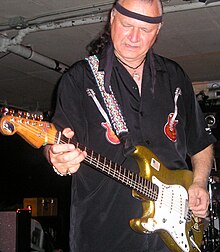
Back ديك دالي (ملحن) Arabic ديك دالى ARZ Dik Deyl Azerbaijani دیک دیل AZB Дик Дейл Bulgarian Dick Dale Catalan Dick Dale Czech Dick Dale Welsh Dick Dale Danish Dick Dale German
Dick Dale | |
|---|---|
 Dale in 2013 | |
| Background information | |
| Birth name | Richard Anthony Monsour |
| Also known as | The King of the Surf Guitar |
| Born | May 4, 1937 Boston, Massachusetts, U.S. |
| Died | March 16, 2019 (aged 81) Loma Linda Hospital, Loma Linda, California, U.S. |
| Genres | |
| Occupation | Musician |
| Instrument | Guitar |
| Years active | 1955–2019 |
| Labels | Capitol, GNP Crescendo Records, Deltone |
Richard Anthony Monsour (May 4, 1937 – March 16, 2019), known professionally as Dick Dale, was an American rock guitarist. He was a pioneer of surf music, drawing on Middle Eastern music scales and experimenting with reverb.[1] Dale was known as "The King of the Surf Guitar", which was also the title of his second studio album.
Dale was one of the most influential guitarists of all time and especially of the early 1960s.[2] Most of the leading bands in surf music, such as The Beach Boys, Jan and Dean and The Trashmen, were influenced by Dale's music, and often included recordings of Dale's songs in their albums.[3] His style and music influenced guitarists such as Jimi Hendrix, Pete Townshend, Eddie Van Halen and Brian May.[3][4]
He has been credited with popularizing tremolo picking on electric guitar, a technique that is now widely used in many musical genres (such as extreme metal, jazz fusion, etc.).[5] His speedy single-note staccato picking technique was unrivaled until guitarists like Eddie Van Halen entered the music scene.[6]
He is cited as one of the fathers of heavy metal for pushing the limits of amplification.[7] Working together with Leo Fender, Dale also pushed the limits of electric amplification technology, helping to develop new equipment that was capable of producing thick and previously unheard volumes including the first-ever 100-watt guitar amplifier.[8] Dale also pioneered the use of portable reverb effects.[9]
The use of his recording of "Misirlou" by Quentin Tarantino in the film Pulp Fiction led to his return in the 1990s, marked by four albums and world tours. He was also nominated for a Grammy in the Best Rock Instrumental Performance category for the song "Pipeline" with Stevie Ray Vaughan.[10] In "Rolling Stone's 100 Greatest Guitarists of All Time", Dale was ranked 31st in 2003 and 74th in the 2011 revision.[11]
- ^ Buckley, Peter (2003). The Rough Guide to Rock. Rough Guides. p. 263. ISBN 9781843531050. Archived from the original on July 7, 2023. Retrieved October 2, 2020.
- ^ "Remembering Dick Dale: Get Soaked With These 7 Surf-Rock Classics". Grammy.com. Archived from the original on January 24, 2022. Retrieved July 22, 2020.
- ^ a b Kreps, Daniel (2019). "Dick Dale, King of the Surf Guitar, Dead at 81". Rolling Stone. Archived from the original on October 6, 2022. Retrieved July 22, 2020.
- ^ Crowther, Linnea (March 18, 2019). "Dick Dale (1937–2019), "King of the Surf Guitar"". Legacy. Archived from the original on October 13, 2022. Retrieved July 22, 2020.
- ^ "How to Melt Faces by Combining Tremolo Picking and Tapping". Guitarworld.com. 2017. Archived from the original on January 24, 2022. Retrieved July 22, 2020.
- ^ Huey, Steve. "Dick Dale Biography". Allmusic.com. Archived from the original on July 9, 2023. Retrieved November 18, 2017.
- ^ Duffy, Mike. "The Father of Surf: 7 Essential Dick Dale Facts. How this SoCal legend pioneered surf music, Fender amplifiers and heavy metal". Fender.com. Archived from the original on January 26, 2023. Retrieved July 22, 2020.
- ^ History Archived September 13, 2016, at the Wayback Machine, Dick Dale official website
- ^ Dregni, Michael (2003). Loudness is next to godliness from This Old Guitar: Making Music and Memories from Country to Jazz, Blues to Rock. MBI Publishing Company LLC. p. 109. ISBN 9781610605496. Archived from the original on February 24, 2024. Retrieved October 2, 2020.
- ^ "Dick Dale". GRAMMY.com. November 19, 2019. Archived from the original on September 20, 2021. Retrieved September 19, 2021.
- ^ Fricke, David (December 3, 2010). "100 Greatest Guitarists". Rolling Stone. Archived from the original on July 29, 2023. Retrieved July 29, 2023.